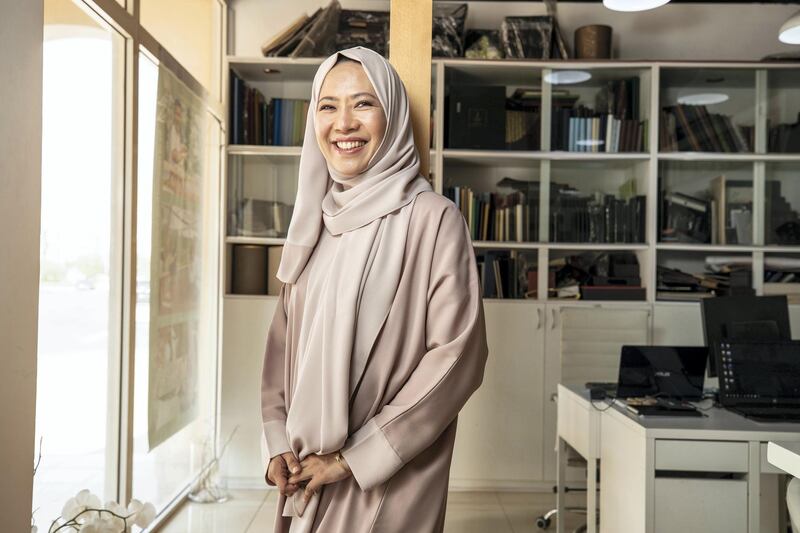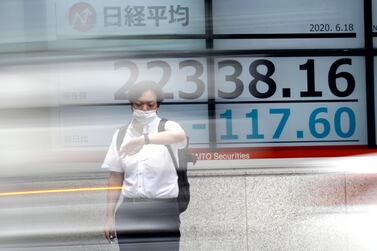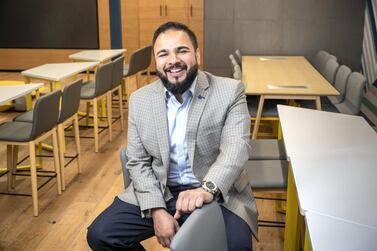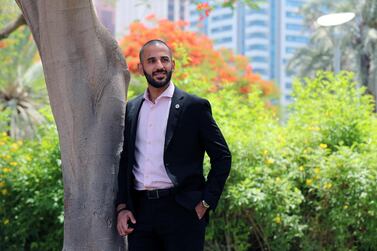When Iman Suguitan saw a potential threat to her marketing job during the 2008-09 financial crisis she set about planning her own business.
A decade on from that recession the Filipina entrepreneur has “hibernated” her now successful premium hotel supplies firm, Ahsant, amid the economic fallout of the Covid-19 pandemic on the hospitality industry.
Far from despairing, however, Ms Suguitan identified a fresh opportunity and started another venture. Not only does the new company Nuqt Idea House – which goes live next week – retain her Dubai International City staff, it harvests lessons from the previous global downturn that could assist other SMEs launching against the pandemic backdrop.
“I’m like a crisis survivor," says Ms Suguitan, who is also a first-time mum of eight months.
Hana Barakat, interim director of startAD – an Abu Dhabi-based global accelerator working with seed stage tech start-ups – says Covid-19 has had a mixed effect on the region’s start-up ecosystem.
She cites a recent study from Wamda and Arabnet that found about 70 per cent of Mena start-ups experienced negative effects from the crisis, including to revenue, funding rounds and pressured cash reserves.
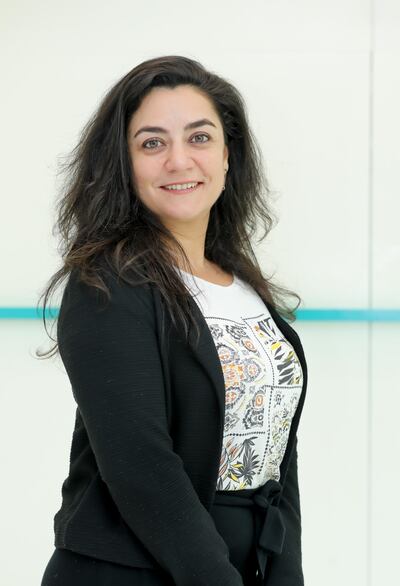
But potential exists for entrepreneurs embracing the market with 18 per cent of those polled saying they experienced a positive impact, notably in e-commerce and healthtech spaces, says Ms Barakat.
“There are great opportunities to start and grow your start-up that directly responds to current market needs in the context of the global economic decline,” she adds.
Ms Suguitan has a history of setting up a business in the middle of a financial downturn. She was the marketing head for premium make-up and kids attire with a local holding company when the 2008-09 global financial crisis hit.
“Every week people would get sacked and you were in the guillotine just waiting,” recalls Ms Suguitan, 41.
Having already taken entrepreneurship classes, she persuaded bosses she could fulfil her duties part-time, thereby reducing her redundancy value while retaining some salary.
With time and cash to market research, source, design and evolve product ranges, she launched Ahsant – an Arabic word meaning ‘job well done’ – and resigned from her full-time role six months later, in 2010. She secured Emaar as her first client and business snowballed to include the Four Seasons, the Address hotel properties, Dubai Opera and others.
Ms Suguitan was confident Dubai's hotel industry would rebound but, while crimping costs, would look to smaller companies with lower overheads and prices.
“I started alone, doing sales, marketing, creating my website, accounting, everything from my apartment, but people need to know when they create a start-up … don’t look too small," she says.
“If you’re a new brand you want to be memorable, stand out, look professional; all your collateral should be there and nicely branded. You only get one chance for a first impression, so make that impression really good.”
This solo structure, fuelled by savings plus loans from friends, enabled her to operate lean and grow organically, without long-term debt.
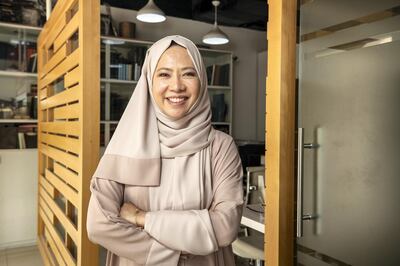
However, with Covid-19-driven movement restrictions all but closing the hospitality industry for three months, Ms Suguitan has had “no choice" but to pause Ahsant's operations and find a way to sustain her employees.
That's why she pivoted their skills for a new “idea-to-market” agency – Nuqt Idea House.
“When the lockdown started, we started working full-time on the collaterals so we are ready to launch on June 28,” she says.
“I’ve the same designers, logistics and administrative people … and everything I;ve learnt as an entrepreneur I’m rechannelling so I still make use of those resources and take advantage of the needs of the market right now.”
Nuqt – Arabic for dots – is aiming to give direction, help companies “through the pain points … to connect dots", says Ms Suguitan.
“Nobody is prepared for a crisis like this, but I’ve been there; I’m sure somebody out there is in the same shoes I was. It took me years to learn certain things, but if I can pass on those learnings and at the same time keep my staff … that idea really excites me.”
Preservation was also on the mind of Annabel Demana when government directives temporarily closed malls – curtailing her retail buying job for a discount stores brand.
”The company had to stop buying activities as their inventories were not selling as fast as before,” says the former accountant.
“It adversely affected my income, it didn’t seem like the situation would be better in the coming months and getting a job somewhere else would also not be possible.”
With time on her hands and Palm Jumeirah rent to pay, Ms Demana, 26, called on experiences starting a business as a student in her native Philippines and founded an e-commerce venture, inspired by the crisis impacting her income.

Discovering that everyday items such as keys, credit cards and earphones host numerous bacteria, Ms Demana sourced a device that uses UV-C light – as hospitals and laboratories do for sterilisation – to sanitise domestic items, including mobiles.
She set-up UVLicht Sanitizer in early May to market a system already popular in the US.
“I tried to find a product that is timely and functional,” she says.
“With the blessing of my current company, I got an NOC and registered the business. Two months later, the product will be in SharafDG, Sprii and many other retail stores, online and offline.”
Launching was not without challenges, of course, not least importing from China during a near global lockdown and facing “insanely expensive” shipping fees beside extended delivery times.
“We had to look for a shipping company that would not charge as much so it wouldn’t hike our product costs and lead to us not having any margin,” says Ms Demana.
Backed by savings and financial help from family and friends, she also made use of local initiatives to ease set-up costs that “could seem too much of a risk especially for start-ups” during current uncertainty.
"Government agencies tried to help small businesses during this period," she says. "There was a more lenient payment structure offered, like monthly instalments, certain fees waived, and online company registration made possible.”
As well as selling directly online, Ms Demana has strategised to sell through big retail names that “can market the product better with their experience and customer base” as life begins to normalise and she prepares to work for her employer again.
StartAD says it has taken a “multipronged” approach to providing start-ups with pandemic-era assistance, including taking advice and mentorship programmes online and creating a relief fund, in collaboration with partners VentureSouq and Scalable CFO. It also unveiled a community fund-raising initiative #LengthenTheRunway, encouraging pledges of goods and services for start-ups.
For start-ups concerned about setting up now, Ms Barakat cites a range of measures implemented by the UAE government and financial institutions for funding stressed start-ups, with the likes of Dubai International Financial Centre, Abu Dhabi Global Market, Kizad and Dubai Silicon Oasis Authority introducing fee waivers and office rental holidays.
Banks are also helping SMEs address debts by offering loan repayment holidays and reducing fees. Meanwhile, investment firms and accelerators, including Hub71, AstroLabs, Beco Capital and Payfort, offer potential funds and business coaching providers Bessern and The Co- Dubai deliver free sessions to those that need help.
“Currently a start-up’s future is highly sector-dependent, but the same is true now as always has been; if an entrepreneur is able to provide a product or service to a market which needs it, they will have a strong business basis," says Ms Barakat.
“The world has adjusted to new forms of living, working and interacting and accordingly there are opportunities available for start-ups to provide innovative solutions for individuals and businesses during this time."
She advises wannabe start-up founders to talk to as many people as possible because "understanding people’s lives and needs is a key part of what defines a great entrepreneur and through this process of uncovering your customer, you can design, build and sell a product that is, for them, truly life-changing".
Ahsant’s Ms Suguitan agrees with that sentiment. If someone aspires to start a business now, they just need to “listen well to what the market needs”, she says.
“Some people still have money and want to do business … entrepreneurs should be out there catching them," she adds.
“There will be days when you are asking ‘why am I doing this?’ … then, you realise, ‘because I love doing this’.”
